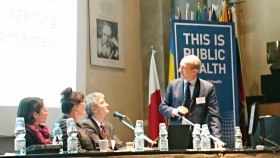
by strengthening education and training
of public health professionals
for both practice and research



The Association of Schools of Public Health in the European Region (ASPHER)
ASPHER is the key independent European organisation dedicated to strengthening the role of public health by improving education and training of public health professionals for both practice and research.Secretariat updates
25 October 2021
In a special webinar today, ASPHER is launching the ASPHER Climate and Health Competencies for Public Health Professionals in Europe. This list will support public health schools to implement education and training for public health professionals to understand the basics, be able to communicate knowledgeably, and form partnerships and alliances in multidisciplinary settings with experts in the area of climate and health.
The need for climate and health education in Europe
An increase in global warming leads to negative impacts on health and wellbeing. Directly, global warming impacts on health through damage to ecosystems on land and sea causing food shortages, starvation and drought. Infectious disease patterns are affected, deforestation leads to interactions between species and exposure to new novel infections and pandemic risks. There is the growing risk of health effects due to extreme weather events, floods, mudslides and forest fires. Indirect consequences of climate change include migration, conflicts, and political instability (World Health Organization, 2018). Human-induced climate change is putting the achievement of all Sustainable Development Goals (SDGs) at risk. In 2017, the European Union attributed to 7.78% of global greenhouse gas emissions, which is the driver of human-induced climate change (Climate Watch Data Explorer, 2020). With vulnerable groups (e.g., minority groups, homeless people, migrants, and people with a disability) at risk, there are widening health inequalities in the region which further deepen social vulnerability and exposure to adverse health impacts (European Environment Agency, 2019). This can for example be seen in extreme weather events and natural disasters, risks to their homes and livelihoods, loss of their personal resources and exposure to rising food prices.
By setting out the European Green Deal in December 2019, the European Commission (2019) aims for a reduction of 50% by 2030. The European Union is committed to a climateneutral Europe by 2050. To reach these goals, an upsurge of climate actions is needed across all sectors, both local and global (World Health Organization, 2018; Law, Saunders, Middleton & McCoy, 2018). In the ‘State and Outlook 2020’ report, the European Environment Agency states that the link between climate change and health is complex (European Environment Agency, 2019). The gaps and uncertainties in evidence make it arguable whether negative health impacts can be reduced by current policies (World Health Organization, 2018). An improvement of the collective understanding of climate and health, and more evidence-based and efficient communication regarding the health risks, efficient solutions and strategies, their costs, and effective implementation are needed to develop and implement proper mitigation and adaptation policies (World Health Organization, 2018; Shaman & Knowlton, 2018).
Due to the complexity of climate change, it is essential that future generations of public health professionals have the knowledge to be able to work on and address the uncertainties faced currently. With the European Green Deal, the Commission commits to preparing a European competence framework for schools, training institutions, and universities to be able to develop and assess attitudes, skills, and knowledge on climate change and sustainable development. The Ostrava Declaration of the WHO Regional Office for Europe (2017) specifies that health aspects of climate change should be included in education curricula, non-formal education, and workforce continuing professional education.
Considering the need for Health in All Policies, public health professionals need to engage with various stakeholders in the debate on the intricate pathways of direct and indirect adverse effects of climate change on health. Public health graduates who have had training in climate change and health can also influence educational institutions from within (Krasna et al., 2020) and reduce the risks and impacts of climate change for European citizens’ health and well-being, by bringing skills and knowledge to the public health workforce. It would mean that universities can contribute to achieving the Union’s 2030 and 2050 goals by including climate and health education in public health curricula.
In previous years, Civil Society Organisations (CSOs) initiatives to include climate change and health in public health curricula have arisen. The Global Consortium on Climate Change and Health (GCCHE; 2018) proposed “Core Climate & Health Competencies for Health Professionals” in 2018. In the same year, the Association of Schools of Public Health in the European Region (ASPHER; 2018) listed three competencies related to climate change in the subsection on “Population Health and Its Material—Physical, Radiological, Chemical and Biological—Environmental Determinants” in the 5th edition of European List of Core Competences for the Public Health Professional. In 2016, the Council of Academic Public Health Institutions Australia (CAPHIA; 2016) listed two competencies related to climate change in their Foundation Competencies for Public Health Graduates in Australia. The most recent addition to CSO-led initiatives is the WHO-ASPHER Competency Framework for the Public Health Workforce in the European Region, which states one competency on climate change: “Knows and correctly identifies the main features of the climate change process, along with its implications for public health, and understands the public health responsibility for the natural environment” (WHO Regional Office for Europe, 2020).
We recognise that not every public health professional needs to become an expert in climatology and ecology, but we argue that all graduates need to understand the basics, be able to communicate knowledgeably, and form partnerships and alliances in multidisciplinary settings with experts in these areas (Middleton, 2016). Interprofessional, interdisciplinary, and transformational educational activities, which require not only problem-solving skills but also system thinking, change and implementation strategies should be included in modern curricula addressing climate change. These competencies are recommended in the frameworks and competencies lists as proposed by the GCCHE, ASPHER, CAPHIA, and WHO-ASPHER Framework for the Public Health Workforce in the European Region and Krasna et al. (2020) echo that the skills that are required in job postings are in alignment with these competencies. Building on the previous lists of competencies, specifically the GCCHE’s Core Climate & Health Competencies for Health Professionals, we propose a set of climate and health competencies for public health professionals in the European Region.
Terms of use · Transparency statement ·Tel: +32 2 735 0890 ·Skype: ASPHERskype ·Mail: office@aspher.org ·Share:
ADDRESS
Aspher SecretariatUM Brussels Campus
Av de l'Armée / Legerlaan 10
BE-1040 Brussels





